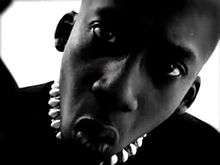Derrick Ashong

Derrick N. Ashong, also known as "DNA", (born 1975 in Accra, Ghana), is a musician, artist, activist, and entrepreneur.
Background
Born in a house with no running water in Accra, Ghana in 1975, Derrick Ashong is the son of a pediatrician.[1] He attended school in Brooklyn, Saudi Arabia, Qatar and Voorhees, New Jersey[2] before attending Harvard University in 1997 where he studied Afro-American studies and was awarded the Hoopes Prize for his senior thesis. After being naturalized as an American citizen, he returned to Harvard through a Paul & Daisy Soros Fellowship for New Americans, and studied for a PhD in Ethnomusicology and Afro-American studies, until Dave Stewart of Eurythmics fame invited him to come work at his entertainment company, Weapons of Mass Entertainment.[2] Ashong was a founding member of the Harvard Black Alumni Society and founded the Black Men's Forum.[3]
Personal
Derrick Ashong is married and has two children.
Arts
Ashong's musical career started while at Harvard. He produced a musical entitled Songs We Can't Sing, for which he won awards,[4] before forming a band called "Black Rose". The band later became known as Soulfège. Ashong has worked with such established artists as Debbie Allen, Janet Jackson, & Bobby McFerrin, and is MC and leader of Soulfège, under the name "DNA", producing works that have aired globally via outlets including MTV Africa, MNet Africa and BBC World Service.[2]
In 1997, Ashong had a role in Steven Spielberg's Amistad,[1] playing the character Buakei, a role he gained through attending an open audition in New York City.[5] He also appeared in a 2006 documentary about the Angola 3, entitled 3 Black Panthers and the Last Slave Plantation.[6] Ashong founded a talent agency, ASAFO Productions.[7]
Ashong is also the former host of The Derrick Ashong Experience on Oprah Radio, The Stream on Al Jazeera English, and DNAtv on Fusion (ABC/Univision). In 2012, Ashong and his team won a Royal Television Society Award and were nominated for a News & Documentary Emmy Award for their work on The Stream.
He received another Emmy nod in 2015 for Take Back the Mic: The World Cup of Hip Hop, the flagship show of his digital media company, amp.it, which launched at the beginning of the same year.
Public roles
Derrick Ashong has lectured on music, technology, the free market, and individualism at over a hundred institutions in the United States, Africa, Europe, the Caribbean and Asia, including the World Music Expo WOMEX in 2003 in Spain,[3] UK Parliament, the UN, and Harvard and Stanford Business Schools. He is the author of FREE THIS CD!!! - The FAM Manifesto - a text outlining the philosophy of open source music,[4] which ultimately led him to found his company, amp.it that rewards and recognizes fans for discovering, sharing and curating original, independent content.
Ashong reached prominent media attention when a YouTube video went viral, of him speaking on Barack Obama's campaign to gain the Democratic nomination for the 2008 U.S. presidential election. Surprising the interviewer who expected a short soundbite (perhaps based on Ashong's casual appearance), Ashong gave a measured and protracted analysis of Obama's campaign.[8] The video has been viewed more than a million times.[1]
He recently founded a Miami-based tech company, called amp.it which in 2015 completed the pilot season of its first media property, Take Back the Mic: The World Cup of Hip Hop, which was a 2015 Emmy finalist in the category of Original Interactive Programming.
References
- 1 2 3 Carr, David (2008-03-17). "More Than a Sound Bite, This Clip Has Some Teeth". New York Times. Retrieved 2008-03-18.
- 1 2 3 "DNA biography". Soulfege. Retrieved 2008-03-18.
- 1 2 "Has this young Ghanaian man won the election for Barack Obama?". Click Afrique. 2008-02-23. Retrieved 2008-03-18.
- 1 2 "Derrick Ashong". The Lavin Agency. Retrieved 2008-03-18.
- ↑ Speedie, Sam (1997-12-11). "Derrick Ashong: Actor, Musician". Harvard Gazette. Retrieved 2008-03-18.
- ↑ "Angola 3". 2006. Retrieved 2008-03-18.
- ↑ "Adapting to the Beat: The Music Industry in Flux". Harvard University. 2004-11-13. Retrieved 2008-03-18.
- ↑ "A Declaration on Independents". The Economist. 2008-02-14. Retrieved 2010-12-02.
External links
- Official website
- Official Soulfège website
- amp.it website
- Free this CD
- Derrick Ashong article on Goodmagazine.com
- Ashong/Obama YouTube Video